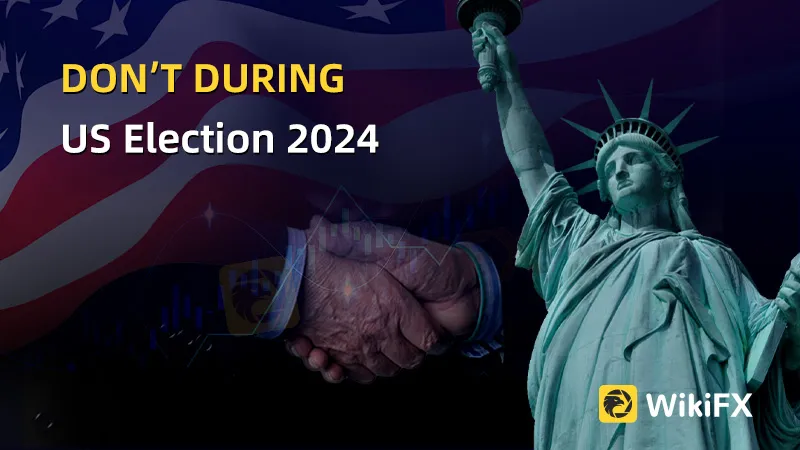简体中文
繁體中文
English
Pусский
日本語
ภาษาไทย
Tiếng Việt
Bahasa Indonesia
Español
हिन्दी
Filippiiniläinen
Français
Deutsch
Português
Türkçe
한국어
العربية
DON’Ts DURING US Election 2024
Abstract: In this article, we will talk about the key points a trader or investor must remember during the US Election. We’ll particularly talk about the don’ts. Let's start.

The race to the White House has started. There are two major candidates, two parties, and a common goal. Who will win the US presidential election: Trump or Harris? It will be officially launched on November 5, 2024. However, this election has already generated a global buzz. The US election would have an impact on the world economy. The FX market would not remain unaffected. Therefore, in this article, we will talk about the key points a trader or investor must remember during the US Election. We‘ll particularly talk about the don’ts. Let's start.
- Don't forget to outline goals: When trading election volatility, you should consider what you want to achieve. Goals, which are Specific, Measurable, and Relevant.
- Don't ignore the latest election developments: Staying on top of the latest election news is the best way to avoid being caught out by sudden market moves.
- Don't put all your eggs in one basket: Diversification refers to having multiple positions open across a range of different asset classes, thus limiting your exposure to the performance of a single asset or instrument.
- Don't forget to use stop-loss orders: A stop-loss order is a handy tool traders and investors use to reduce their risk exposure. Its an instruction to a broker to close a losing trade when an instrument reaches a certain price level.
- Don't let your emotions take more out of you: Traders can use a variety of tactics to meet their objectives. However, success is the product of a systematic strategy. You can't rely on 'feelings' or 'intuition'.
- Don't ignore the election's impact: Every US election has a big impact on markets throughout the world. The result influences international trade agreements, geopolitical stability, US tax rates, and economic policy.
- Don't miss out on opportunities: Volatility presents risks when trading but is also a tremendous gift – one that presents bigger price moves and therefore more opportunities to profit.
Trade Safely and Wisely. If you wish to keep up with related news. Download the WikiFX app to make your trading experience safer and smoother.

Disclaimer:
The views in this article only represent the author's personal views, and do not constitute investment advice on this platform. This platform does not guarantee the accuracy, completeness and timeliness of the information in the article, and will not be liable for any loss caused by the use of or reliance on the information in the article.
Read more

Why Your Stop Loss Keeps Getting Hit & How to Fix It
Many new traders run into the same frustrating problem. They analyse the market, place a trade, and watch the price go against them just enough to hit their stop loss. Then, like a bad joke, the price moves exactly in their predicted direction. Read this article to learn how to fix this issue for good!

Safe-Haven Surge: Gold Shines Amid Market Turmoil
Rising geopolitical tensions fuel a flight to safety, propelling gold past key resistance and positioning it as a top-performing asset in today’s volatile market.

Forex Trading Challenges in India
Explore this guide to understand the challenges that deter India's forex market from unleashing its true potential.

The Deepening Roots of Forex Scams in India
Check out how forex scams in India have expanded beyond banks and unregistered brokers to include the informal gang racket duping investors every day.
WikiFX Broker
Latest News
Advantages of Using EA VPS for Trading - Detailed Guide
$1.1 Million Default Judgement Passed Against Keith Crews in Stemy Coin Fraud Scheme
MetaQuotes Rolls Out MT5 Build 5120 with Enhanced Features and Stability Fixes
Indian "Finfluencer" Asmita Patel Banned: SEBI Slaps Charges on Her Company, AGSTPL
HDFC Bank's Green Push: Empowering 1,000 Villages with Solar Energy
Safe-Haven Surge: Gold Shines Amid Market Turmoil
Why Your Stop Loss Keeps Getting Hit & How to Fix It
How Money Moves the World | Why Finance Matters for Everyone
IG Japan Issues Trading Alert as Israel‑Iran Tensions Escalate
Investor Alert: SEBI Introduces New UPI Safety Net Against Scam Brokers
Currency Calculator


